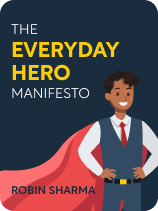

This article is an excerpt from the Shortform book guide to "The Everyday Hero Manifesto" by Robin Sharma. Shortform has the world's best summaries and analyses of books you should be reading.
Like this article? Sign up for a free trial here.
What is The Everyday Hero Manifesto by Robin Sharma about? Do you want to release your inner hero?
Robin Sharma’s The Everyday Hero Manifesto provides suggestions for strengthening your mind, body, and heart to fulfill your heroic potential. This is for you to realize that you can accomplish great things.
Read below for a brief overview of The Everyday Hero Manifesto.
The Everyday Hero Manifesto by Robin Sharma
In Robin Sharma’s The Everyday Hero Manifesto, you’ll learn that each of us has the potential to achieve great things—we don’t need superpowers or incredible natural talents to do so. By following the system laid out in this book, you can unlock your heroic potential, realize your dreams, and become a force for good in the world.
Sharma is a leadership expert, motivational speaker, and international bestselling author. He’s arguably best known for his self-help parable The Monk Who Sold His Ferrari (1996), which blends Buddhist teachings with secular practicality to help you live a healthy, balanced, and fulfilling life. The Everyday Hero Manifesto (2021) is the basis of one of Sharma’s online self-help courses and is, according to some reviewers, the most important book he’s ever released.
Introduction: You’re a Hero
Sharma begins by saying that everyone has the ability to be an everyday hero. For Sharma, a hero is an ordinary person who lives in an extraordinary way. You don’t need to be a genius or have any exceptional talents to be a hero in Sharma’s eyes—you simply need to fully commit to your purpose in life, exhibit positive attributes like integrity and empathy, and try to make the world a better place.
For example, a paramedic who saves lives is an everyday hero, but so is an artist whose work uplifts and inspires people. An office worker who always does his best, and who’s always ready to brighten someone else’s day with a joke or a kind gesture, could also be an everyday hero.
| What Kind of Hero Are You? Jim Kwik’s book Limitless has a similar premise to The Everyday Hero Manifesto: Everyone has the potential to do extraordinary things. However, whereas Sharma says that you don’t need to be a genius to do great things, Kwik says that you already are a genius—you just need to figure out what kind of genius you are. If you think you’re not a genius, it’s because you haven’t been playing to your strengths. For example, some people are exceptionally good at memorizing small, intricate details, while others are exceptionally good at understanding large-scale concepts. However, if those two types of people tried to take on each others’ roles, they wouldn’t do very well. So, while you’re learning how to become an everyday hero, also think about what kind of heroic work you’re best suited for. For example, if you’re good with details, perhaps one way you could become an everyday hero would be to handle birthday celebrations in your workplace: Learn when your coworkers’ birthdays are and make sure they get recognition, cards, or gifts to help brighten their days. |
Realize Your Heroic Potential
Becoming a hero like Sharma describes doesn’t require superpowers or extraordinary talents, but it does require work. In this section, we’ll go over Sharma’s suggestions for how to strengthen your mind, body, and heart to realize your full heroic potential. We’ll also explore how to set up your workspace and living space to help you succeed.
Empower Your Body
Sharma says that being in good physical health will greatly boost your energy and confidence, which is crucial for someone who wants to accomplish great things.
Empower Your Mind
Just like you need to eat a healthy, well-balanced diet in order to have a strong body, Sharma says that you need to “feed” your mind educational and empowering ideas in order to strengthen it.
Think about the people you spend the most time with, the TV shows you watch, and so on—anything that you regularly feed your mind. Make sure you’re getting helpful and inspirational messages from them; get rid of anyone and anything that frequently gives you degrading, hurtful, or hateful ideas.
Empower Your Heart
A strong body and mind are crucial for an everyday hero, but Sharma says that you’ll never reach your full potential unless your heart’s in it, too. He adds that past traumas often weigh heavily on your heart and stop you from bringing your full energy and enthusiasm to what you’re doing. In this section, we’ll explore two steps Sharma shares for recovering from such experiences, thereby empowering your heart.
Create an Empowering Environment
So far, all of Sharma’s advice has been about empowering yourself. However, you don’t exist in a vacuum; your surroundings can also have profound impacts on your energy, confidence, and enthusiasm. Therefore, as much as possible, you should shape your environment to help you succeed.
First, set up your workspace to motivate yourself and eliminate distractions. For example, hang inspirational art on the walls or fill a bookshelf with books that are meaningful to you. If there’s something that tends to pull your attention away from your work, such as a television, get rid of it if you can.
Second, Sharma suggests keeping your surroundings clean, both at work and at home. Keeping your home and office clean will give you a sense of empowerment and control—you can look around and see the immediate, tangible effects of the work you’ve done (cleaning). Conversely, being surrounded by dirt or clutter is distracting and stressful, so it will keep you from doing your best work each day.
How to Be a Hero Every Day
We’ve explored Sharma’s definition of a hero and how to bring out the hero that was always inside you. In this final section, we’ll discuss the five principles that Sharma says allow you to get the best results from your heroic abilities.
Principle 1: Focus on the Tasks That Matter
Stop just keeping yourself busy, and start doing meaningful, purposeful work.
Sharma notes that often, we equate “having a busy life” with “being productive.” However, if your time is packed with busywork and distractions, rather than work that advances you toward your meaningful goals, then you’re not truly being productive. Further, you’re not living up to your heroic potential. To become an everyday hero, you must replace mindless distractions and less-impactful tasks with purposeful and rewarding work.
For instance, imagine you currently spend an hour each workday in meetings that don’t really require your attendance and an hour each evening scrolling social media. To use that time more wisely and heroically, you might spend it developing your professional skills, creating art that holds significant meaning for you, or doing volunteer work for a cause you believe in. You might also spend time helping others—we’ll discuss the importance of this in detail later.
Principle 2: Build Self-Confidence
Stop saying “I can’t,” and start saying “I can.”
Sharma means this literally. The words you say affect your mindset, so every time you say “I can’t,” you’re weakening yourself, and every time you say “I can,” you’re empowering yourself.
To boost your confidence and get in the habit of using empowering words, Sharma suggests that you start each day with a simple mantra (a word or short phrase that focuses your thoughts). For example, before you get out of bed in the morning, you might say, “Today I will be kind, enthusiastic, and productive.”
You can also use words to guide your mind away from negative thoughts. For instance, if you notice self-defeating or belittling thoughts creeping in, say something like, “Let’s not think about that,” or, “That’s not who I am.”
Principle 3: Take Responsibility
Stop making excuses, and start taking responsibility.
Sharma says that your power comes from taking responsibility for everything in your life—that it’s up to you, and nobody else, to create the life you want. Blaming other people or circumstances for your problems might soothe your ego, but it will also trap you in a mindset of helplessness: You’ll convince yourself that you’re powerless and there’s no point in trying to improve your situation.
For example, an aspiring author sometimes needs to submit a manuscript to dozens of different publishers before one of them accepts it; even then, the author might have to do numerous revisions before it’s ready for publication. An author who takes responsibility for her own outcomes will do that and whatever else is necessary to get the book published. On the other hand, an aspiring author who doesn’t take responsibility might soothe her ego by blaming a rejection or set of extensive revisions on the publisher, the industry, or anything else that makes it someone else’s problem. She might decide that she simply can’t succeed in these hostile conditions and give up on finding a publisher for her book.
Principle 4: Be Resilient
Stop getting discouraged, and start getting motivated.
Sharma says that an everyday hero finds inspiration in hardship and failure; every setback is a chance to learn and a reason to improve. For example, if you were passed over for a promotion at work, that’s an opportunity to ask your boss how you can become a better employee—and to transform your disappointment into motivation to work harder.
Further, stop brooding about events that left you feeling bitter or regretful. If there’s a lesson to learn from those events, learn it, then let the memories go. Reflect on your joys and triumphs—remember the great things you’ve already done, so you’ll know that you can overcome your current struggles.
Principle 5: Live Selflessly
Don’t just do great things; do great things for others.
Sharma says an everyday hero understands that helping others is the best way to enrich your own life and find true happiness, satisfaction, and pride in who you are. Therefore, make helping others your greatest passion—in other words, use your heroic abilities to benefit others, not just yourself.
This final principle goes directly against the common belief that there’s not “enough” for everyone: enough money, enough resources, enough respect, and so on. People who hold this belief try to take whatever they can, at everyone else’s expense, because they’re afraid of not having enough resources for themselves.
This selfishness is an ancient and deeply-rooted survival instinct, but it’s one that you can overcome through compassion and rational thinking. Sharma urges you to recognize that the world today is very different from how it was for our ancestors; today, there is enough for everyone to survive and be happy.

———End of Preview———
Like what you just read? Read the rest of the world's best book summary and analysis of Robin Sharma's "The Everyday Hero Manifesto" at Shortform.
Here's what you'll find in our full The Everyday Hero Manifesto summary:
- Why you don't need superpowers in order to achieve great things
- How to unlock your heroic potential and become a force for good
- Why helping others is the best way to enrich your own life






